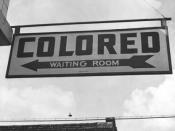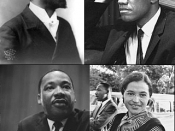During World War II, black men and women had many reasons to be angry and resistive as America entered the war. Many were initially reluctant to support the war because they could not forget the unfulfilled promises generated by World War I. African Americans were dealing with segregation, lynching and even the Ku Klux Klan. Women on the other hand couldn't even receive high paying jobs, none the less were quickly replaced in the work field by the returning soldiers. Despite the patriotism of African Americans and women towards America, both groups faced discrimination during World War II, thus asking the question: If America is strong enough to fight these massive wars, why are there racist and sexist struggles among our own people?
About one million African Americans were added to the industrial labor force in hopes of benefiting from opportunities created by the wartime economy. Most found only frustration and disappointment, while few gained access to industrial jobs and training programs.
While blacks turned to the union for help, the number of unionized black workers highly increased. They became frustrated, creating race riots and "hate strikes" to protest the promotion of black workers. Whether as soldiers or civilians, all faced discrimination and segregation. During the war, the National Association for the Advancement of Colored People (NAACP) came into being as part of the "Double Victory", which meant V for victory over fascism and V for victory for equality at home.
Over 200,000 women served in the military in non-combat roles. Just as in World War I, women were replacing men in the work field. This was symbolized as "Rosie the Riveter." The government responded to the critical need for female labor by creating massive propaganda and established new policies that promoted- but did not mandate- equal pay...


